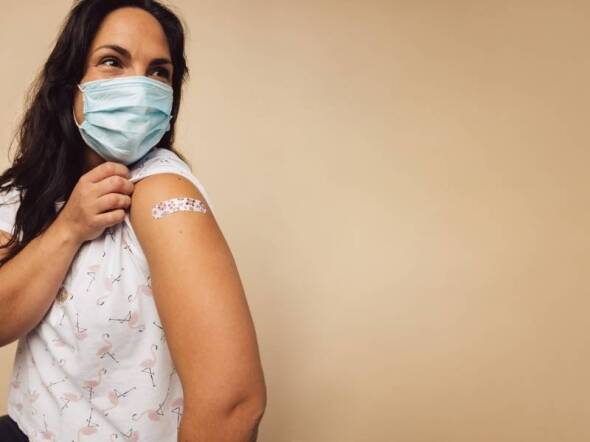Do you want to get pregnant but are hesitant about getting the Covid vaccine? You’re not alone.
Whether your hesitation stems from the fact that the vaccine is so new or those persistent infertility rumors on the Internet, your reluctance is not only understandable but very common. Since pregnant and breastfeeding women were not included in the initial clinical trials, and the effect of the vaccines on fertility was not studied (at the onset), many women are wary of receiving the vaccines. After all, every woman wants only the best for themselves and their future children.
The good news is that today, in June 2021, there is a lot more data on the effect of COVID vaccines on fertility, pregnancy, and breastfeeding, and it is much more optimistic and reassuring than you may think.
‘While getting the Covid vaccine is a personal choice that women should discuss with their OBGYNs and primary doctors, evidence points to the safety of this vaccine in women trying to conceive and already pregnant, especially when weighed against the risks of severe Covid infection in these patient populations,’ said Dr. Daniel Kaser.
Many studies have shown that pregnant women are at a greater risk of contracting severe Covid illness than non-pregnant women, which in extreme cases can result in preterm birth or stillbirth for the baby and hospitalization and death for the mother.
No such data has been linked to being vaccinated before or during pregnancy.
So let’s dig into that data, starting with the big one – the infertility rumor.
Do the Covid mRNA vaccines cause infertility?
The simple answer is no.
This rumor, started by a former Pfizer employee, states that because the spike protein in the mRNA vaccines is similar to a naturally occurring human protein called syncytin-1 that is essential to the formation of the placenta, women who get the vaccine will develop antibodies to the placenta-producing protein, resulting in the body attacking that protein and causing infertility.
In truth, many immunologists, doctors, and scientists have passionately and conclusively debunked this rumor. They explain that the similarity between the spike protein in the vaccine and syncytin-1 is extremely small – too small for the body to confuse the two and attack the placental protein.
Their explanation is not only rooted in science but has played out in the real world.
First, in the vaccine trials themselves – 17 women in the vaccine group of the clinical trials for Moderna and Pfizer got pregnant during the trial, indicating the vaccines did not prevent pregnancy (also, these pregnancies are ongoing).
Second, almost 5,000 people in the U.S. have reported post-vaccination pregnancies to the CDC, indicating that vaccines do not cause infertility. In reality, this number is probably much higher since it will include those who did not report their pregnancies to the CDC.
Finally, several IVF patient population studies have found the vaccines do not affect ovarian function, egg quality, fertilization, or pregnancy rates.
It should also be noted that Moderna, Pfizer, and J&J animal trials showed no safety concerns before or during pregnancy. If this rumor were true, Covid infection would also cause infertility in women, which it has not.
Is the vaccine safe to get during pregnancy?
An increasing amount of data overwhelmingly points to the safety of the vaccine in pregnancy. As of the end of May 2021, more than 121,000 pregnant people in the U.S. had gotten vaccinated.
The CDC has now taken the position that pregnant women can be vaccinated, and many states are prioritizing pregnant women for vaccination.
In deciding to offer the vaccine to pregnant women, the CDC suggests considering how likely you are to be exposed to the virus, how likely you are to get very sick from it, the benefits of being vaccinated, and the limited yet growing body of evidence pointing to the safety of vaccination in pregnancy.
A big chunk of this data is from the CDC and the other federal health bodies who have collected pregnancy and birth data on women who were vaccinated during pregnancy and found that the rates of adverse events (such as miscarriage) were the same in this group as the general population.
Studies have also shown that the mRNA vaccines do not cross the placenta, vaccination is not associated with placental problems, and getting vaccinated during pregnancy gives your baby protective Covid antibodies.
Getting vaccinated when you are breastfeeding is also good for your baby, as studies have shown that while the vaccines do not pass into breast milk, the antibodies do.
The other piece of good news is that more information is coming – both Pfizer and J&J are currently conducting clinical trials for pregnant women and their babies, and that data should be released in the fall.
Can I get the COVID vaccine while I’m undergoing IVF or IUI?
Yes, but timing matters – according to the American Society for Reproductive Medicine, patients who are scheduled for an Intrauterine Insemination (IUI), egg retrieval, or embryo transfer should not get their vaccine within three days of their fertility procedure.
So if you are scheduled for your egg retrieval on July 15, you should avoid getting your vaccine from July 12-18. This mostly has to do with the chance you may develop a slight fever from the vaccination, and it could make doctors think the fever is from the fertility procedure.
Getting a vaccine shot during ‘the two-week wait,’ however, is not a problem.
What else should I know?
The main thing you should know is the very small risk of developing blood clots as a result of the J&J vaccine. All women younger than 50 years old, pregnant or not, should be aware of this risk.
Other than that, know that more data becomes available every day, adding to the mounting body of evidence in support of vaccination for women looking to get pregnant and those already pregnant.
